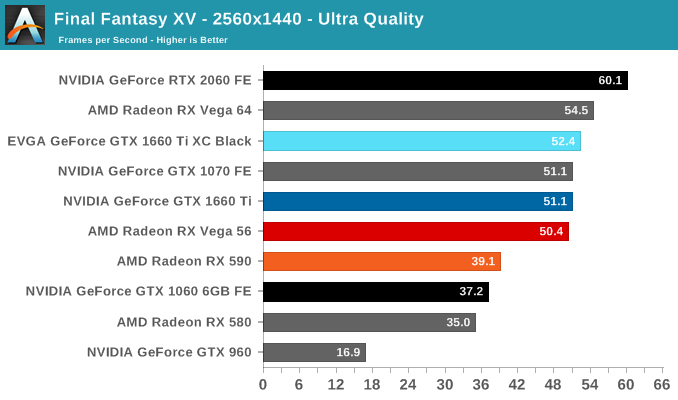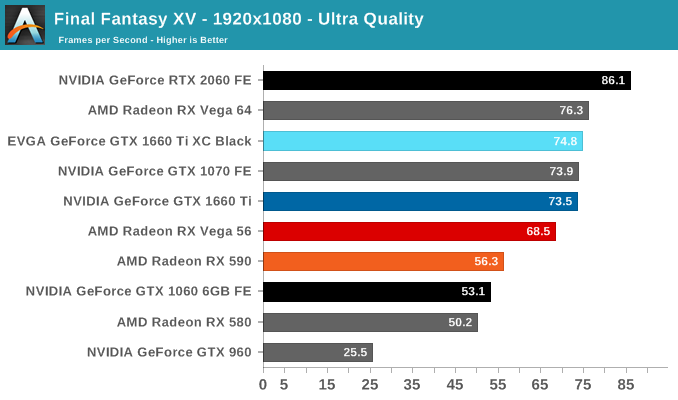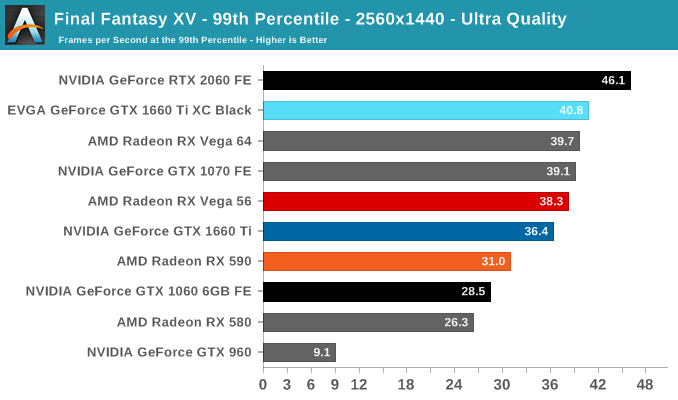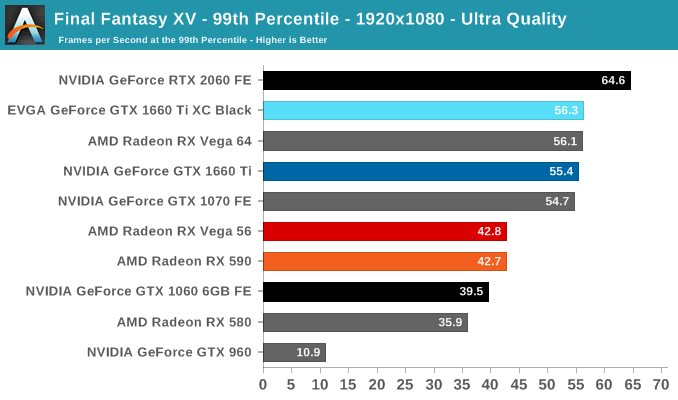The NVIDIA GeForce GTX 1660 Ti Review, Feat. EVGA XC GAMING: Turing Sheds RTX for the Mainstream Market
by Ryan Smith & Nate Oh on February 22, 2019 9:00 AM ESTFinal Fantasy XV (DX11)
Upon arriving to PC earlier this, Final Fantasy XV: Windows Edition was given a graphical overhaul as it was ported over from console, fruits of their successful partnership with NVIDIA, with hardly any hint of the troubles during Final Fantasy XV's original production and development.
In preparation for the launch, Square Enix opted to release a standalone benchmark that they have since updated. Using the Final Fantasy XV standalone benchmark gives us a lengthy standardized sequence to utilize OCAT. Upon release, the standalone benchmark received criticism for performance issues and general bugginess, as well as confusing graphical presets and performance measurement by 'score'. In its original iteration, the graphical settings could not be adjusted, leaving the user to the presets that were tied to resolution and hidden settings such as GameWorks features.
Since then, Square Enix has patched the benchmark with custom graphics settings and bugfixes to be more accurate in profiling in-game performance and graphical options, though leaving the 'score' measurement. For our testing, we enable or adjust settings to the highest except for NVIDIA-specific features and 'Model LOD', the latter of which is left at standard. Final Fantasy XV also supports HDR, and it will support DLSS at some later date.




Final Fantasy V is another strong title for NVIDIA across the board, and the GTX 1660 Ti comes very close to the RX Vega 64, let alone surpassing the RX 590 and RX Vega 56.
The GTX 960 is clearly out of its element, and given the 99th percentiles it's fair to say that the 2GB framebuffer shoulders a good amount of the blame. By comparison, this makes the GTX 1660 Ti look exceedingly good at offering basically triple the performance (and amusingly, triple the VRAM).











157 Comments
View All Comments
PeachNCream - Friday, February 22, 2019 - link
This article reads a little like that infamous Steve Ballmer developers thing except it's not "developers, developers, developers, etc" but "traditional, traditional, traditionally, etc." instead. Please explore alternate expressions. The word in question implies long history which is something the computing industry lacks and the even shorter time periods referenced (a GPU generation or two) most certainly lack so the overuse stands out like a sore thumb in many of Anandtech's publications.Oxford Guy - Saturday, February 23, 2019 - link
How about the utterly asinine use of the word "kit" to describe a set of RAM sticks that simply snap into a motherboard?The Altair 8800 was a kit. The Heathkit H8 was a kit. Two sticks of RAM that snap into a board doth not a kit maketh.
futurepastnow - Friday, February 22, 2019 - link
A triple-slot card? Really, EVGA?PeachNCream - Friday, February 22, 2019 - link
Yup, for 120W TDP of all things. But it's in the charts as a 2.75 slot width card so EVGA is probably hoping that no one understands how expansion slots actually would not permit the remaining .25 slot width to support anything.darckhart - Friday, February 22, 2019 - link
lol this was my first thought upon seeing the photo as well.GreenReaper - Saturday, February 23, 2019 - link
I suspect it was the cheapest way to get that level of cooling. A more compact heatsink-fan combo could have cost more.130W (which is the TDP here) is not a *trivial* amount to dissipate, and it's quite tightly packed.
Oxford Guy - Saturday, February 23, 2019 - link
I think all performance GPUs should be triple slot. In fact, I think the GPU form factor is ridiculously obsolete.Oxford Guy - Monday, February 25, 2019 - link
Judging by techpowerup's reviews, though, the EVGA card's cooling is inefficient.eastcoast_pete - Friday, February 22, 2019 - link
@Ryan and Nate: What generation of HDMI and DP does the EVGA card have/support? Apologize if you had it listed and I missed it.Ryan Smith - Friday, February 22, 2019 - link
HDMI 2.0b, DisplayPort 1.4.